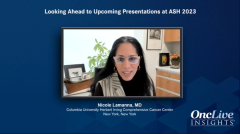
Zanubrutinib Plus Sonrotoclax in Patients With Treatment-Naïve CLL/SLL
Nicole Lamanna, MD, discusses the results from the ongoing BGB-11417-101 study investigating combination zanubrutinib plus sonrotoclax in patients with treatment-naïve CLL/SLL.
Episodes in this series

This is a video synopsis/summary of an Insights featuring: Nicole Lamanna, MD.
Dr. Lamanna discusses early phase 1/2 data with the B-cell lymphoma 2 (BCL2) inhibitor sonrotoclax for chronic lymphocytic leukemia (CLL) that will be presented at the 2023 American Society of Hematology (ASH) annual meeting.
Sonrotoclax is being studied as monotherapy or in combination with the Bruton tyrosine kinase (BTK) inhibitor zanubrutinib at varying dose levels. With about 90 patients enrolled at the time of abstract submission, over 50% who had response assessments achieved a response, though follow-up is short at a median of 4 months. Complete response rates increased over time, with a median of 10 months to complete response.
Compared to the approved BCL2 inhibitor venetoclax (Venclexta), no significant tumor lysis syndrome has been observed thus far, though the phase 1 design involved strict monitoring and dose escalation. Longer follow-up data are needed.
Lamanna notes sonrotoclax is hypothesized to be a more potent BCL2 inhibitor than venetoclax. Further data will provide information on whether it induces more side effects like neutropenia, cytopenias, and gastrointestinal toxicities that are common with venetoclax.
Overall these early results are encouraging for potentially having a new BCL2 inhibitor option for CLL. Further development and comparison to venetoclax-based regimens will be important.
Video synopsis is AI-generated and reviewed by OncLive® editorial staff.





































